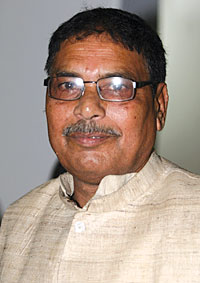 KIRAN PANDAY |
Nepal is ranked 143 out of 180 by Transparency International's Corruption Perceptions Index 2009. This will come as no surprise to anyone who lives here. We all know how things work (or don't) in Nepal, at all levels, in all walks of life. Corruption is a many-splendoured thing in this country - could it be so pervasive, so integral to the Nepali way that we don't even notice it anymore �it comes as naturally as drinking water to a fish in the sea?
It's not entirely true that we have become oblivious to corruption, but perhaps we too often focus on the big fish � most notably those netas who trample on our trust. This may be because the headlines tend to focus on the more spectacular cases, such as those taken on by the failed CIAA and those deplored by donors of late. There seems to be a perception that curbing corruption, like economic growth, can really have a trickle-down effect.
But what of everyday, run o' mill corruption? As we cuss out Ram Chandra Kushwaha for singlehandedly threatening a $2.6 billion education sector reform programme through his cackhanded exploits as Minister of Eejitification, do we even stop to explore the significance of afno manche, source-force and ghus? Close to everyone in Nepal is implicated in this game. If poorer, less connected Nepalis don't possess the wherewithal to move events in their favour, it's not for lack
of trying.
The more prosperous are most implicated, clearly. Employment, school admissions, bank loans, administrative fixes, you name it, they'll be kow-towing and cowing and straight-up palm-greasing to get what they want. The inefficiencies of the Nepali bureaucracy encourage some forms of corruption - a quick bribe to expedite land sales or visa applications, for example. But there are other corruptions that directly undermine the creation of a merit-based society, and their consequences are far more significant.
Such behaviour on the part of the Nepali elite quite naturally encourages the have-nots to indulge in the same to the extent to which they are capable. Entire generations of Nepalis grow up with the expectation of benefiting from peer-to-peer relations or patronage networks. At best, we can extol the realities and benefits of social capital and note that so-called developed countries get along quite fine with nexuses of old-boy networks. At worst, we have the wrong people in the wrong places, while the brightest cannot be their best. And this plays a key role in resentment on the part of communities who don't have an in on the system. The results are plain to see.
What can be done to stem the rot? Institutions such as the CIAA may not be working now, and a whole raft of anti-corruption legislation is yet to be implemented, but they remain essential if we are to address corruption in Nepal. But the first steps must be taken by each one of us, and this is the most difficult thing to do, given how corruption is indeed a matter of perception. We are embedded in a society largely accepting (and even admiring of the fruits) of corruption.
So dare to allow your children to make their way through life on the basis of merit, and merit alone. This does not of course mean you should not support them emotionally and materially the best you can - but this should not be at the expense of someone more deserving. Be patient and resist the bureaucrat's demand for a bribe, even in the face of inefficiencies and inconveniences that seemed designed to encourage fast-tracking. Face up to the consequences of your actions next time you get stopped for a traffic offense �or something more serious.
This may sound ridiculously impractical, and as a member of the Kathmandu elite, I risk being dubbed a hypocrite. But even if one chooses to keep the focus on the real criminals, it's worth considering if your actions have a wider moral significance. Just remember that the big fish all started as small fry like you and me. And as Prithvi Narayan Shah declares via a notice in Morang district's Land Revenue Office, 'Those who take and give bribes are the great enemies of the nation.'
READ ALSO:
License to loot, by Prashant Jha - From issue # 491 (26 Feb 2010- 04 March 2010)
The Little Big Man, by Ass - From issue #491 (26 Feb 2010- 04 March 2010)



